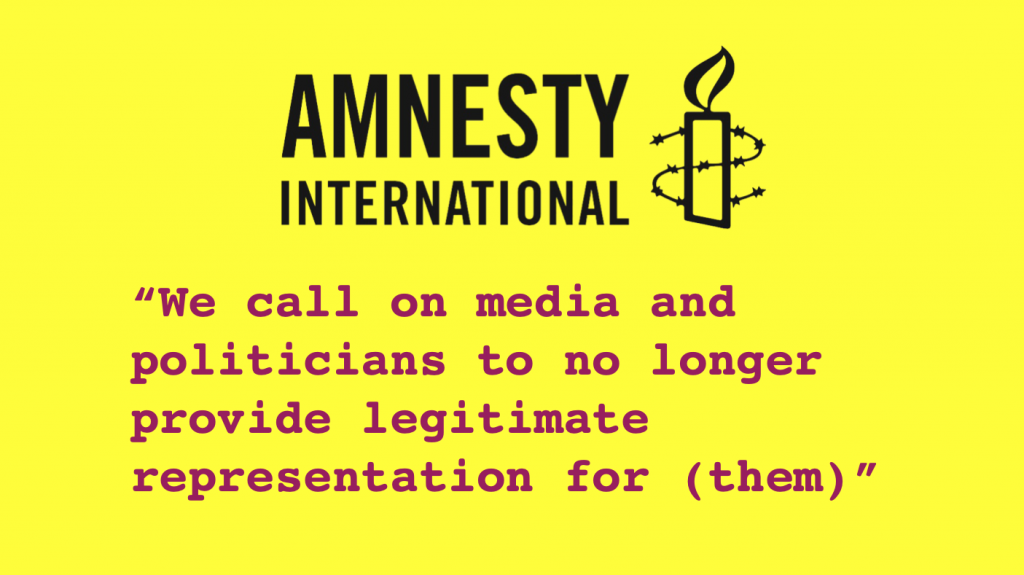
Amnesty signed a letter that says:
We repudiate their beliefs, and call for an end in giving airtime to (them)… We call on media, and politicians to no longer provide legitimate representation for (them).
In response to criticism led by Iseult White, Amnesty then falsely claimed that the letter says something different:
For example, the letter asks for media and politicians to not grant legitimacy to (them), or to present them as legitimate.
But that is simply not what the letter says. The letter plainly calls for an end to giving them airtime, which must include being banned from the State’s national airwaves.
It refers to denying legitimate “representation for” them, not to “presentation of” them. The different meanings of these words are clear and unambiguous.
Also, even the false denial is damaging. Amnesty should not even be asking the media and politicians to deny legitimacy to democratic activists and advocacy groups.
Amnesty was established to do the precise opposite — to defend democratic activists and advocacy groups when others try to deny them legitimacy.
Who is Amnesty seeking to silence?
The letter uses various terms to target people, without explicitly naming them, as:
“Pseudo-feminists” who “do not represent the wider LGBTI+ community nor feminists in Ireland,” and “newly launched organisations that seek to defend biology or fight gender identity and expression.”
“Discriminatory organisations and vocal transgender exclusionary activists,” who “call for division based on falsities and bigotry,” who “fear and hate (an inclusive Ireland) and do anything in their power to tear it down,” and who “align themselves with far-right tropes and stances.”
The letter also makes claims about them that are irrelevant to democratic engagement, saying that they:
“Do not represent the wider LGBTI+ community nor feminists in Ireland” and “are not supported by the wider Irish community,” that their ideas “are not native to the queer and feminist communities of Ireland” and “are representative of outsiders that have not worked, laboured, or known the trans community in Ireland,” and that they “are not organisations at all, and have no governance or accountability.”
One of the targets is LGB Alliance Ireland
Colm O’Gorman, Executive Director of Amnesty Ireland, later identified the “outsiders” reference as meaning from the UK.
While the letter targets people and groups in the plural, Colm identified one of the groups as being LGB Alliance Ireland.
LGB Alliance Ireland recently wrote an article in the Irish Independent explaining who they are. They said:
They campaign for the rights of same-sex-attracted people, based on their sexuality. All their committee members live in Ireland, with representation in each of the four provinces. They believe the needs of lesbian, gay and bisexual people are different to the needs of transgender people. They respect the rights of other organisations to campaign for trans rights, and they do not hate or abuse them. They want to resolve differences of beliefs through open debate, and in a civilised fashion.
Whether or not you agree with them, these are legitimate aims for a democratic lobby group in a pluralist republic. We have moved beyond the authoritarian Ireland of de Valera and McQuaid, and we will not return to it.
What Amnesty should do
Amnesty Ireland is a human rights organisation. It should remove its endorsement from this letter, because it undermines the reason that the organisation exists.
If Amnesty genuinely did not realise what it was signing, then it should say that, instead of falsely claiming that the letter says something different than it does.
It should actively support the sex-based rights of women and LGB people, the gender-based rights of transgender people, and the protection of children.
It should support everybody’s right to democratically promote any or all of these positions, including through legitimate representation from the media and politicians.
And where there are competing claims of human rights, Amnesty should lobby the government to legally balance these claims consistently with human rights principles.






No comments